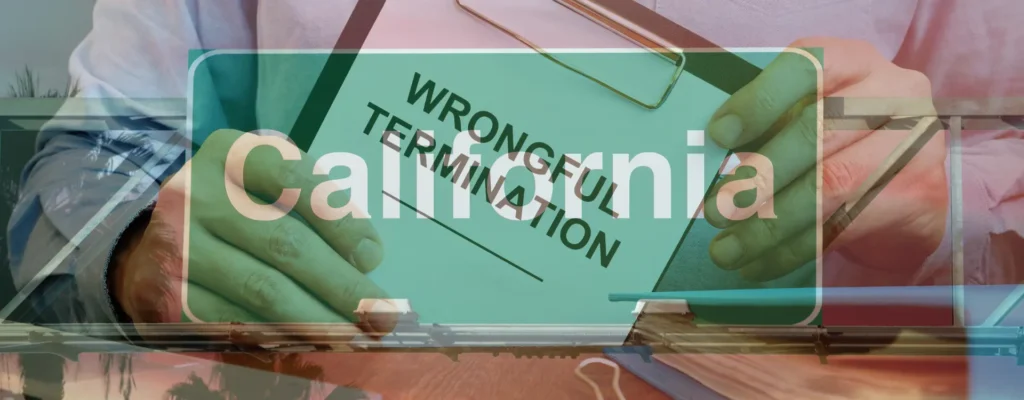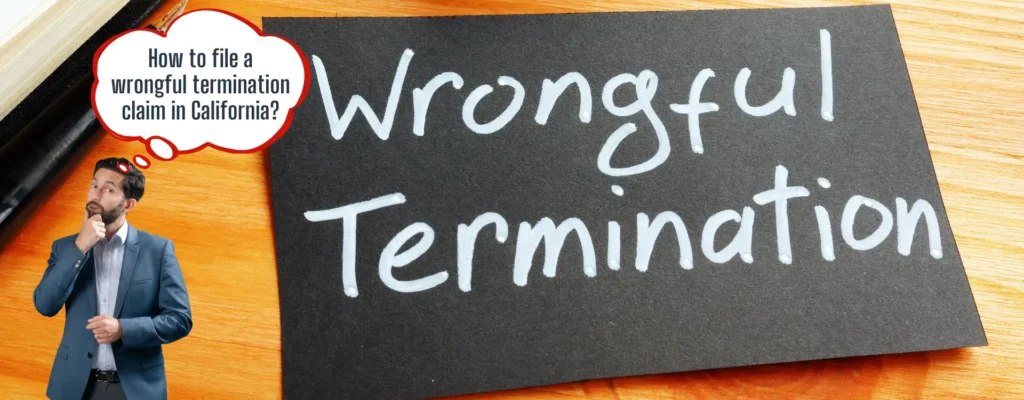
Wrongful termination is a term that resonates with many in the workforce, particularly in California, where the employment laws are designed to protect workers from unfair dismissal.
Understanding what is considered wrongful termination California, and knowing how to file a wrongful termination claim, is vital for any employee who believes they have been unjustly let go from their job.
Do you need compassionate support and effective representation?
No fees unless we win. Available 24/7.
Understanding Wrongful Termination California
California is an “at-will” employment state, meaning employers can terminate employees at any time for any reason, except for illegal ones.
However, there are circumstances under which terminating an employee violates the California Labor Code or federal law, thereby constituting wrongful termination. These include dismissal based on discrimination (race, gender, religion, etc.), retaliation (for whistleblowing or exercising a legal right, such as taking family leave), and violation of public policy (firing an employee for refusing to break the law).
Identifying wrongful termination is the first step. If your dismissal was due to discriminatory reasons, as a form of retaliation, or in breach of a contractual obligation, you might have a case for filing a compensation claim against your employer.
How to File a Wrongful Termination Claim in California

Filing a wrongful termination California involves several steps. The process to prove wrongful termination can seem intricate, but with the right approach, you can assert your rights effectively. Here’s what you need to do:
1. Gather Evidence
Begin by collecting any evidence that supports your claim. This could include emails, messages, employment contracts, performance reviews, witness statements, and any other documentation that can prove your termination was wrongful.
2. Understand the Deadline
Timing is critical. For most wrongful termination claims, you have a specific window to file a complaint, starting from the date of your dismissal. For example, claims filed under the California Fair Employment and Housing Act must typically be lodged within three years of the alleged discriminatory deed.
However, timelines can vary depending on the nature of your claim, so verify the deadlines applicable to your case. We’ll discuss more further down this blog.
3. File a Complaint with the Relevant Agency
For claims involving discrimination or retaliation, you’ll usually need to file a complaint with the DFEH before pursuing any legal action in court. This step is known as “exhausting your administrative remedies.” The DFEH investigates the complaint, and if they find merit, they can mediate or file a lawsuit on your behalf. Alternatively, they may issue a “right to sue” notice, allowing you to take your case to court.
4. Consider Mediation
Mediation is a voluntary process where a neutral third party helps you and your employer resolve the dispute without going to court. It can be a faster, less expensive option than litigation and is worth considering if both parties are open to it.
5. File a Lawsuit
How to file for wrongful termination in California? If your case cannot be resolved through administrative remedies or mediation, your next step is to file a lawsuit. At this stage, having a skilled attorney becomes indispensable. A lawyer can help you navigate the filing process, represent you in court, and work towards securing the best possible outcome for your case.
More on the Statute of Limitations for a California Wrongful Termination Case
In California, the statute of limitations for filing a wrongful termination case depends on the nature of the claim.
For cases involving discrimination, harassment, or retaliation, employees generally have three years to file a complaint with the California Department of Fair Employment and Housing (DFEH). Once a “right to sue” notice is received, the employee then has one year from the date of termination to file a lawsuit in court.
For wrongful termination claims that are based on a violation of public policy or a breach of contract (or a related unlawful reason), the statute of limitations can vary, often ranging from two to four years, depending on the circumstances.
Recoverable Damages from a Wrongful Termination Claim in California
If you succeed in a wrongful termination lawsuit, you may be entitled to various types of recoverable damages designed to compensate you for the losses you’ve suffered:
- Lost Wages and Benefits: Compensation for past and future earnings and benefits lost due to the termination.
- Emotional Distress: Damages for mental suffering caused by the wrongful termination.
- Punitive Damages: Awarded to punish the employer for particularly malicious or egregious behavior.
- Legal Costs and Attorney’s Fees: Reimbursement for expenses incurred in pursuing the wrongful termination claim.
Wrongfully Terminated? Why You Should Seek Help From an Employment Attorney
Filing a wrongful termination claim in California can be a detailed process requiring a deep understanding of labor law. An experienced employment lawyer can provide invaluable assistance by:
- Evaluating your claim to determine its strength and viability.
- Guiding you through the filing process and ensuring all deadlines are met.
- Collecting and organizing evidence to build a strong case.
- Representing you in negotiations, mediations, or court proceedings.
File a Wrongful Termination Lawsuit in California. Call RTM Law Firm for a Free Case Review.
If you believe you’ve been wrongfully terminated for an illegal reason, it’s important to act swiftly and seek professional guidance.
RTM Law Firm specializes in employment law and wrongful termination cases. Our team has the expertise and dedication to support you through your claim, aiming for the best possible outcome.
If you need assistance or advice on how to file a wrongful termination claim in California, contact our wrongful termination lawyer today. Let us help you assert your rights and seek justice.
Do you need compassionate support and effective representation?
No fees unless we win. Available 24/7.




